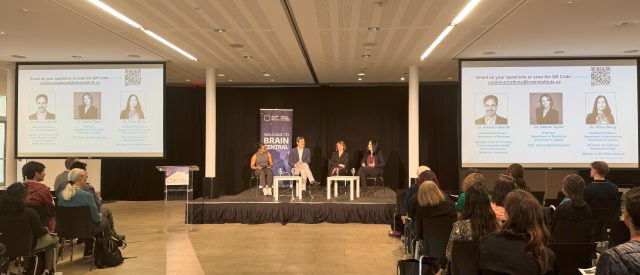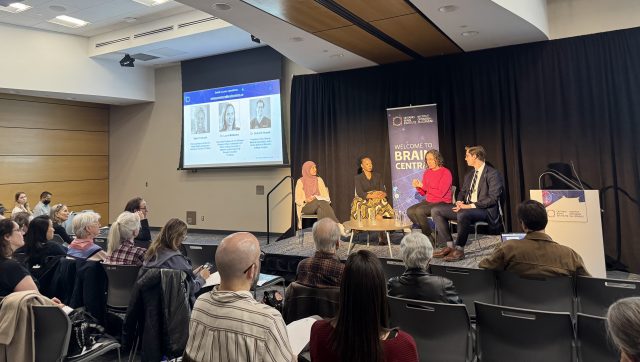“Some say we live in an era of polycrisis, a state of risk where multiple crises intersect to amplify their collective impact. In such a world, if we are committed to the well-being of Canadians and the country is to flourish, we need a broadly-shared effort. Building Canada’s future needs political, social and economic forces aligned to a shared commitment to enhancing the well-being of Canadians. Philanthropy has a role to play.”
– B. Miller and P. Fardy, “To spur productivity and economic growth, philanthropists must step up,” The Globe and Mail, Dec. 2, 2024.
About the author

A recent article published in The Globe and Mail explored the crucial role that philanthropy has to play in boosting Canada’s productivity and economic growth, particularly through funding research and innovation.
Authors Bernard Miller, managing trustee of the Killam Trusts, and Peter Fardy, principal adviser at Northport Philanthropic, argue that despite significant donations, such as endowment funds and other large gifts for medical and educational research, our country still faces a growing gap in highly qualified personnel compared to other developed countries.
Mr. Miller and Mr. Fardy make the case that this gap cannot be closed by government or industry alone and that more visionary philanthropists are needed to help bridge and build Canada’s future. I invite you to read their opinion piece if you can.
It was encouraging for me to read these thoughtful positions on the integral role that philanthropy can play in fostering and driving innovation in Canada. Mr. Miller and Mr. Fardy are absolutely correct that if we are to prepare Canada for the future, ignite productivity and boost our economy, we need collaboration and commitment from government, the private sector and philanthropists combined.
Our origin story at Ontario Brain Institute (OBI) has a similar narrative – that the vision of a philanthropist can ignite long-term, sustainable innovation efforts.
OBI was established in 2009 by Joseph Rotman, a notable businessman and philanthropist. In partnership with our other founders, the two-million-dollar initial investment into OBI has been translated into a $600M impact on the neuroscience ecosystem in Ontario, with effects felt across the country.
Their faith in the potential of a Brain Institute in Ontario, and their leadership in bringing the idea to fruition, has directly led to transformative work across the brain health landscape.
The gift from our founders was initially allocated to training and education – with a goal of nurturing an entrepreneurial spirit and developing management capacity that would help grow and sustain a dynamic neurotech cluster and brain health sector. To date, OBI has supported close to 100 entrepreneurs, which has helped moved 26 products to market, including a robotic brace that helps children with mobility challenges gain strength, endurance and proper gait patterns. Additionally, more than 80% of our 183 interns found full-time employment within six months of completing our program. In fact, some of our trainees are now fueling the brain health sector – a principal at an investment firm; chief privacy officer at an academic hospital, chief financial officer at a publicly traded biotech company, to name just a few.
Investments like the ones Miller and Fardy reference in their submission, as well as the initial gift OBI received, help to identify, develop and secure solutions that can be turn into supports across communities.
In our case, at OBI, we strive to build cohesion and efficiencies, scale programs and innovation, and spend a great deal of time investing in training for the next generation of front-line workers to improve brain care health throughout Canada. Through initiatives such as the creation of a new care pathway for identifying people with Alzheimer’s disease through our Community-Led Real-World Neurotech Experience (CORTEX) program, and investing in evaluation capacity building for community organizations through the Growing Expertise in Evaluation and Knowledge Translation (GEEK) program, two of which have received follow-on funding from the Hilary and Galen Weston Foundation to expand their reach – we are honouring the belief our founders had in our institute’s potential.
Recently, we celebrated our latest cohort of neurotech entrepreneurs, recipients of our Neurotech Entrepreneurship to Validate Emerging Innovations (NERVE) program funding – Canada’s largest single award to catalyze early-stage neurotechnology. As I listened to presentations from the group of eight phenomenal talents addressing a broad spectrum of challenges in brain health, neurodiversity and neurological disorders, it was clear we do not lack visionary thinking in our country.
What we do need more of are visionary philanthropists willing to invest in the future of Canada, the health and wellness of our people, and who aspire in leaving a lasting legacy.
Support the future of brain health – learn how you can help OBI transform lives.



